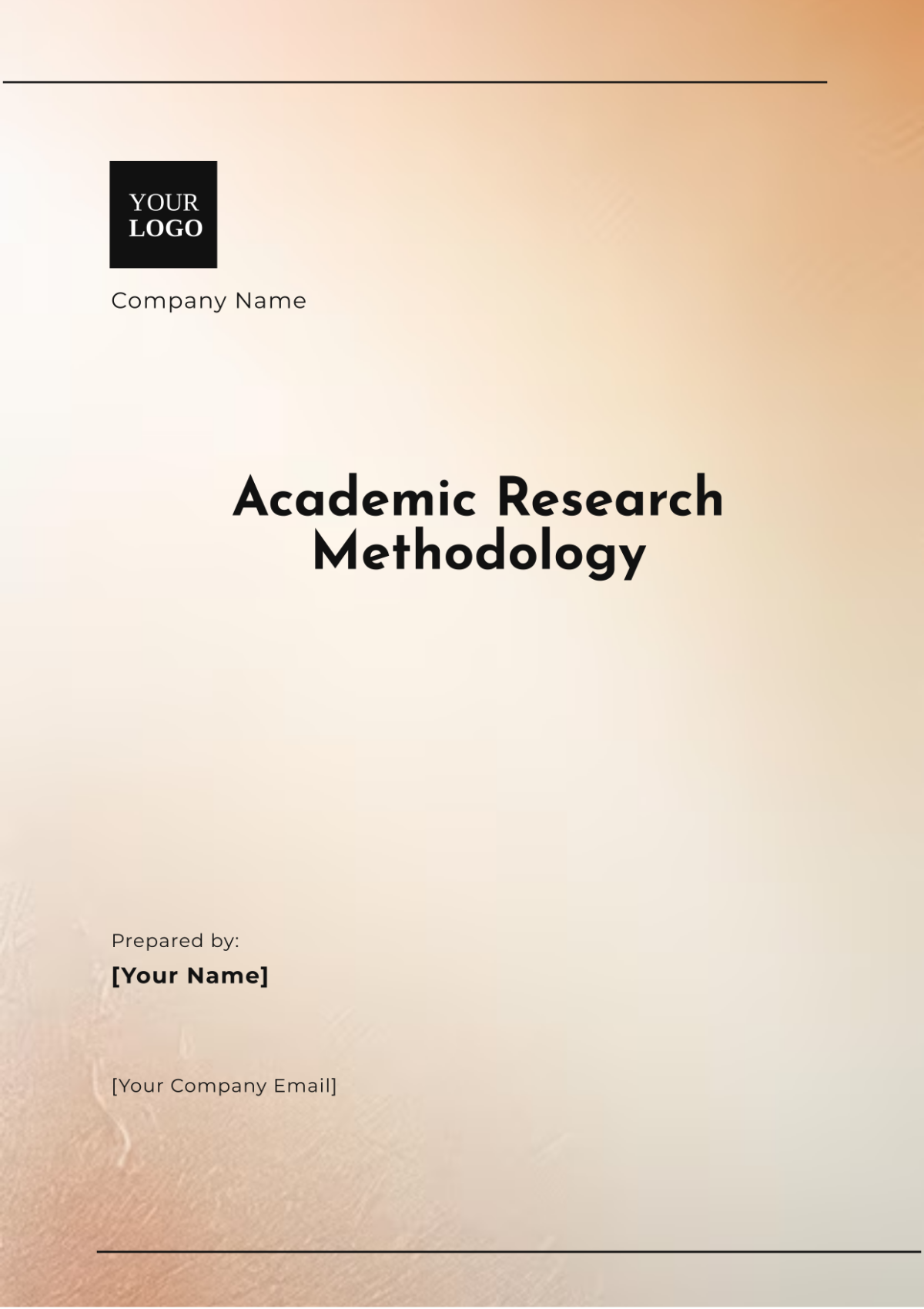Academic Research Methodology
Prepared By: [YOUR NAME]
Affiliation: Department of Research and Development, Global Insights Inc.
Company Name: [YOUR COMPANY NAME]
I. Introduction
Academic Research Title: Investigating the Impact of Digital Marketing Strategies on Consumer Behavior in the Post-2050 Era
 The study aims to uncover trends and shifts in consumer preferences as new technologies and platforms emerge. Understanding these dynamics will provide valuable insights for businesses and marketers adapting to future market conditions.
The study aims to uncover trends and shifts in consumer preferences as new technologies and platforms emerge. Understanding these dynamics will provide valuable insights for businesses and marketers adapting to future market conditions.
II. Research Design
This research will employ a mixed-methods approach, combining qualitative and quantitative techniques to gain a comprehensive understanding of consumer behavior. Qualitative data will be collected through in-depth interviews with industry experts and focus groups with consumers. Quantitative data will be gathered via surveys distributed to a large, diverse sample of digital users.
III. Data Collection Methods
Data will be collected using a combination of online surveys and semi-structured interviews. The online surveys will target a broad demographic to ensure diverse representation, while interviews will provide deeper insights into consumer attitudes and motivations. All data collection will adhere to strict ethical standards and privacy guidelines.
Sampling
The research will utilize stratified random sampling to ensure that various demographic segments are adequately represented. Participants will be selected based on criteria such as age, gender, and digital usage patterns. The sample size will be determined to provide statistically significant results and ensure the reliability of findings.
Age Groups
Gender
Digital Usage Patterns
Heavy User
Moderate User
Light User
Data Breakdown
Age Group | Gender | Digital Usage | Number of Participants |
|---|
18-24 | Male | Heavy User | 50 |
18-24 | Male | Moderate User | 30 |
18-24 | Male | Light User | 20 |
25-34 | Male | Heavy User | 60 |
25-34 | Male | Moderate User | 40 |
35-44 | Male | Heavy User | 40 |
35-44 | Male | Moderate User | 35 |
35-44 | Male | Light User | 25 |
45+ | Male | Heavy User | 30 |
45+ | Male | Moderate User | 25 |
45+ | Male | Light User | 20 |
Age Group | Gender | Digital Usage | Number of Participants |
|---|
18-24 | Female | Heavy User | 55 |
18-24 | Female | Moderate User | 35 |
18-24 | Female | Light User | 25 |
25-34 | Female | Heavy User | 65 |
25-34 | Female | Moderate User | 45 |
25-34 | Female | Light User | 35 |
35-44 | Female | Heavy User | 45 |
35-44 | Female | Moderate User | 40 |
35-44 | Female | Light User | 30 |
45+ | Female | Heavy User | 35 |
45+ | Female | Moderate User | 30 |
45+ | Female | Light User | 25 |
Age Group | Gender | Digital Usage | Number of Participants |
|---|
18-24 | Non-binary | Heavy User | 10 |
18-24 | Non-binary | Moderate User | 5 |
18-24 | Non-binary | Light User | 5 |
25-34 | Non-binary | Heavy User | 15 |
25-34 | Non-binary | Moderate User | 10 |
25-34 | Non-binary | Light User | 10 |
35-44 | Non-binary | Heavy User | 10 |
35-44 | Non-binary | Moderate User | 8 |
35-44 | Non-binary | Light User | 7 |
45+ | Non-binary | Heavy User | 7 |
45+ | Non-binary | Moderate User | 5 |
45+ | Non-binary | Light User | 5 |
Total Participants by Category
Age Group:
18-24: 235
25-34: 310
35-44: 240
45+: 182
Gender:
Male: 390
Female: 455
Non-binary: 122
Digital Usage:
Heavy User: 387
Moderate User: 293
Light User: 287
Data Analysis
Data analysis will involve both statistical techniques and thematic analysis. Quantitative data will be analyzed using statistical software to identify patterns and correlations, while qualitative data will be examined to uncover recurring themes and insights. This comprehensive analysis will help in drawing meaningful conclusions about the impact of digital marketing strategies.
Ethical Considerations
The research will uphold the highest ethical standards by ensuring informed consent, confidentiality, and the right to withdraw from the study at any time. All personal data will be anonymized and securely stored. Ethical approval will be obtained from the relevant research ethics committee before data collection begins.
IV. Limitations
Potential limitations of this study include sample bias and the rapid pace of technological change, which may affect the generalizability of findings. The study's reliance on self-reported data could also introduce response bias. Despite these limitations, the research aims to provide valuable insights into future trends in digital marketing.
V. Conclusion
This methodology outlines a structured approach to investigating the effects of digital marketing strategies on consumer behavior. By employing a mixed-methods approach and adhering to ethical standards, the research seeks to deliver actionable insights for businesses navigating the evolving digital landscape. The results are expected to contribute to a deeper understanding of future consumer trends and marketing effectiveness.
Research Templates @ Template.net































 The study aims to uncover trends and shifts in consumer preferences as new technologies and platforms emerge. Understanding these dynamics will provide valuable insights for businesses and marketers adapting to future market conditions.
The study aims to uncover trends and shifts in consumer preferences as new technologies and platforms emerge. Understanding these dynamics will provide valuable insights for businesses and marketers adapting to future market conditions.